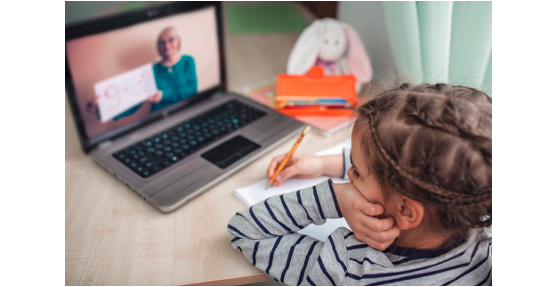COVID-19 and keeping your children safe online
 Being connected online helps children and teenagers reduce the impact of this new normal
Being connected online helps children and teenagers reduce the impact of this new normal
Due to the spread of COVID-19, children are affected by physical distancing, quarantine, and school closures. Some young children may feel isolated, anxious, bored, and uncertain. They may feel fear about the impact of the virus on their families.
Being connected online helps children and teenagers reduce the impact of this new normal and encourages them to continue with their lives. But it also presents a new set of challenges for parents. Here are some of the World Health Organization (WHO) recommendations to help parents engage with their children and help them understand the impact of the pandemic on lives of people, the challenges it brings to their routine and what can be done to keep them safe online.
-
Open communication
Work with your child to establish rules on how, when and where devices can be used. Have an open dialogue with your child about who they communicate with and how. Make sure your children understand that discriminatory or inappropriate contact is not acceptable and encourage them to tell you immediately if they experience any of these. Be alert if your child appears to be exposed to such online activities or if they are experiencing cyberbullying.
-
Using the right technology
Make sure that your child’s device is running the latest software and antivirus programs, and that privacy settings are on. Parental control tools, including safe search, can help keep online experiences positive. Remember to check the privacy settings to minimize data collection. Help your child learn to keep personal information private. Your child should never have to provide a photo or their full name to use free online educational resources. Keep webcams covered when not in use.

-
Spend time with children when they are online
Spend time with your child to identify age appropriate apps, games and other online activities. Help your child recognize and avoid misinformation and age-inappropriate content that may increase their anxiety about the COVID-19 virus. Many digital resources from credible organizations like the United Nations International Children's Emergency Fund (UNICEF) and the World Health Organization (WHO) are available for you and your child to learn about the virus together. Be sure to create opportunities for your child to have safe and positive online interactions with friends, and family - connecting with others is important at the moment of physical distancing and this can be an excellent opportunity for you to model kindness and empathy in your child’s “virtual interactions”.
-
Encourage healthy online habits
Promote and monitor good behavior online and on video calls. Encourage your children to be kind and respectful to classmates, to be mindful of what clothes they wear and to avoid joining video calls from a bedroom. Familiarize yourself with school policies and helplines to report cyberbullying or inappropriate online content. As children spend more time online, they can be exposed to more advertising that may promote unhealthy foods or age-inappropriate material. Help them recognize online ads and use the opportunity to explore together what is wrong with some of the negative messaging you and they see.
-
Let them have fun and express themselves
Encourage your child to take advantage of digital tools that get them up and moving, like online exercise videos for kids and video games that require physical movement. Remember to balance online recreation with offline activities, including time outside, if possible.
Sources: The World Health Organization (WHO) | United Nations International Children's Emergency Fund (UNICEF)
Contributors: Dr. Sonia Chaabane, Dr. Sohaila Cheema, and Dr. Sathyanarayanan Doraiswamy
Editing: Mr. John Hayward